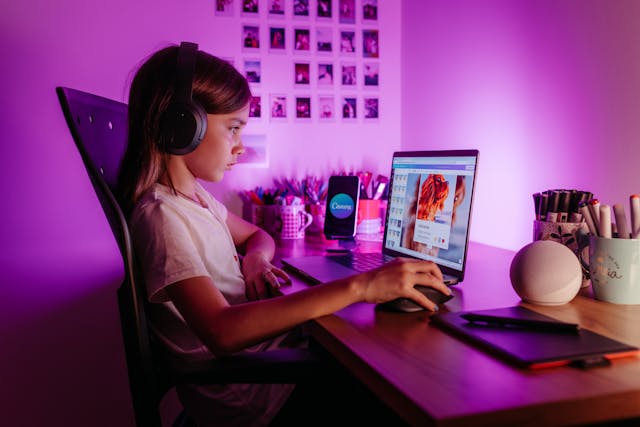Letting Children Constantly Use Screens is a Clear Leadership Failure
 With three teenage kids, keeping phones off the dinner table is a constant battle for me—one I need to be better at fighting.
With three teenage kids, keeping phones off the dinner table is a constant battle for me—one I need to be better at fighting.
What’s tricky is phone use often happens reflexively. For example, someone might ask a question about tomorrow’s weather, or when concert tickets go on sale, and inevitably a phone gets picked up to find the answer. Before long, everyone is on their devices.
However, this is no excuse. Phones shouldn’t be near our dinner table; if they are, that’s on me as a parent and leader. While I often judge families with young kids completely immersed in iPads and headphones, it’s a reminder that even occasional phone-checking by teenagers—though less extreme—is still a bad habit, and I need to be better about holding the line with my own family.
Screen usage has skyrocketed over the past decade for adults and kids alike. When my children were younger, my wife and I rarely let them eat meals in front of the television. We were hardly an exception: at the time, allowing kids to do so was widely considered careless parenting. Today, however, it has become entirely normal for young children to bring their screens to the table and stay totally absorbed in them.
While I was aware of this negative trend, my recent holiday vacation underscored just how pervasive this problem has become. On that trip, I saw so many family dinners at restaurants where teens were glued to their phones and young children were fixated on their iPads. The worst part is most of these kids/teens were often with other people their age and could have interacted with their peers, rather than their devices.
I remember how hard it was to keep my kids entertained at a restaurant when they were little. When we went out to eat, we brought games, puzzles, clay, crayons, and cards to occupy them throughout the meal. The big difference was that we gave them things that engaged their minds and encouraged them to interact with others, rather than numbing and muting them.
 Experts unanimously agree that excessive screen time is harmful for kids, and it’s often linked to developmental and behavioral challenges in young children. Eating in front of screens has been shown to disrupt hunger awareness, leading to overeating and increased obesity risk. And screen time increasingly replaces essential developmental activities like creative play, socialization, and family connection—which are all critical for emotional and social growth.
Experts unanimously agree that excessive screen time is harmful for kids, and it’s often linked to developmental and behavioral challenges in young children. Eating in front of screens has been shown to disrupt hunger awareness, leading to overeating and increased obesity risk. And screen time increasingly replaces essential developmental activities like creative play, socialization, and family connection—which are all critical for emotional and social growth.
Why bring your kids to a family dinner just so they can stare at a screen or watch a video with headphones on? If you’re not communicating with your kids at dinner, you’re not really spending quality time with them.
Sometimes, we all need a wakeup call—I know I did. After being horrified by what I saw at restaurants during vacation, I enforced a hard “no phones” rule at dinner on a recent ski weekend with two of my kids. Phones stayed at home or in jackets.
When we did this, we found ourselves observing our surroundings more, which prompted interesting discussions. My daughter noticed how the kitchen staff had one person who meticulously checked every order before it went out, and it sparked a conversation about process and efficiency. We also had more quiet time for reflection, something increasingly rare but essential. In today’s world, too few people can sit alone with their thoughts, a troubling and unhealthy trend.
At those phoneless meals, I was more aware of families where everyone—old and young—was on their device, and I noted the contrast between our conversation and their disengagement. It became clear to me that allowing technology to take over our meals isn’t just unhealthy—it’s a failure of leadership.
 Not all leaders are parents, but all parents are leaders—arguably the most important kind. Leaders set the standard and hold everyone to it, even if it isn’t popular or easy. We bear responsibility for allowing kids to spend so much time in front of screens. And doing this sets children up for eventual loneliness and social challenges, especially in a world where meaningful human interaction and thoughtful contemplation will be one of the few things to differentiate us from machines.
Not all leaders are parents, but all parents are leaders—arguably the most important kind. Leaders set the standard and hold everyone to it, even if it isn’t popular or easy. We bear responsibility for allowing kids to spend so much time in front of screens. And doing this sets children up for eventual loneliness and social challenges, especially in a world where meaningful human interaction and thoughtful contemplation will be one of the few things to differentiate us from machines.
As parents, if we want better outcomes for our children, we must lead by example and uphold the same standards we strive for in other areas of life. Moving forward, I am going to focus on improving my own phone habits at home and especially at meals, setting a stronger example for my kids.
Our kids desperately need the ability and tools to connect—with others, the world around them, and themselves.
Quote of The Week
"Social media and screen time are training wheels for anxiety and depression.” - Jonathan Haidt
Robert Glazer
Founder, Chairman Of The Board, Acceleration Partners
Join 200,000 leaders around the world who receive my Friday Forward each week.
podcast: The Elevate Podcast (2M+ Downloads)
my TedX talk: “It’s Time To Eliminate Two Week’s Notice






